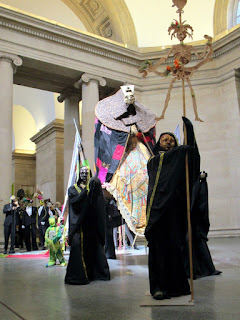The idea was that I would meet S.D. at Tate Britain, but at first we
managed to miss one another – I had, inexplicably, the wrong time and the wrong
entrance, and at one stage we were both waiting for one another in different
places. Neither of us had a mobile number for the other! But we did coincide
eventually, and began our lunch in the Tate café rather hungrier than we intended
to be. S.D. had a triple-bypass operation earlier in the year and two cataract
removals, so feels a bit fragile and is having to get used to pacing himself
rather more than usual. ‘I’ve reached the point where getting through each day,
and then waking up in the morning, counts as a success’. I admitted I already
felt like that, and that it would be better to leave something to look forward to
in the future.
S.D. is covering for one of the Canons at Westminster Abbey as Canon in Residence
(‘I only have to read the first lesson
at Mattins and Evensong, and be on hand in case the place burns down’), so as
he left I looked round the shop. On the way we passed the Tate’s monumental
current installation, ‘Procession’ by Hew Locke, a witty and thoroughly scary
investigation of politics and social identity through something that looks like
a religious event (‘Just like St Mary’s Bourne Street’ – that’s S.D., not Hew
Locke) but with no liturgical content.
Usually I can be relied on to leave a gallery or museum shop with a
handful of postcards but I thought 85p was a bit cheeky. I looked at the books.
At the moment, as far as books are concerned, I am battling my way through
three: Andrew Hickey’s The Mind Robber (one of Obverse Books’ ‘Black Archive’
volumes about individual Dr Who stories), Brian Bailey’s Great British
Ruins from 1984 (a nice easy come-down bedtime read), and Airhead by
Emily Maitlis, recounting the real experience of being a leading BBC news interviewer.
I only got hold of that because there was a pile of copies in one of the
churches I visited recently, with the instruction to take one away for free,
but it has nice, short chapters and is physically light, making it an ideal train read –
and very revealing of Maitlis and her interviewees. In the Tate shop there were
hundreds of fascinating titles I would like to read, but I know I never would
(I congratulated myself for owning a couple already). Analyses of colonialism
and feminist art, of cultural trends and social phenomena: some of these are
important, and in fact they might change the way you look at the world. Most of
them will have been laboured over with commitment and dedication. But who will
read them? Will they happen to find their way into the mind of someone who
might have their worldview shifted by them, might as a result go on to do something
which would affect their own life and others’?
It is no surprise that at my time of life I might think about what I have done with it. I know I’ve wasted a lot of time, but am I wasting it now? I’m not necessarily haunted by the thought that I might not have gone to the right places, had the most worthwhile experiences, or read the most enjoyable books from the Tate shop: that’s a consumerist approach to life I don’t endorse. But have I produced the most worthwhile things? Who will have listened to all my sermons, or read all the things I have written? I know what Father Somerset Ward would say, which is that our main concern should be to pray, so that our minds can be shaped after the mind of Christ: that there is no other way of pouring our own contribution into the life of the world that goes with the flow of the heavenly will. One can hope!



No comments:
Post a Comment